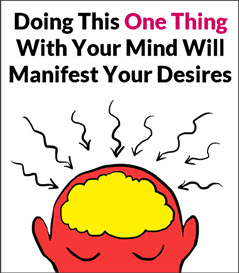|
Neuro Linguistic Programming at its core appears to be about one thing: changing habitual levels of thinking over time so you are focusing and behaving in new ways. A way to overcome problems is to change the way you THINK and perceive the problems I would like to have a guess at. Many of the processes on this website encourage a re-training of beliefs and thinking around certain subjects. Even meditation is evoked to be a way of 'thought stopping' to slow someways habitual train of thoughts out there. I don't know why I've had this revelation, but I have seen a connection between NLP and just about every process with the motivation that processes are designed to transform thinking patterns. Especially in this guise of 'manifesting' something, where the pursuit is in changing a way to think about something you desire and eventually change the way you feel about it. Different emotions symbolise different fashions of thinking. So I think I have cracked the nuts and bolts of manifesting. Are all processes just about changing our minds and our systems of thinking, our habitual thoughts, to perceive our desires in a new way? In a way where we feel we can attain them? Because if that's the case then I feel the impulse to go straight back to classic NLP for my work. |
|
Your focus determines your reality. So it follows that anything that causes you to change your habitual focus also changes your habitual (or "usual") physical reality. Yes, NLP changes your focus. So does stroking your cat. It would be just as accurate to say that all manifesting processes are simply fancier versions of stroking your cat :)
Thanks Stingray
(09 Jan '18, 23:13)
Nikulas
|
|
No, it's the other way around. NLP is a fancy version of these processes. These processes are as old as the universe, and we are now simply experiencing them in a unique way. History has established a worldview where everything is considered solid, dead and mechanical, like a large machine. So far so good, says the universe, if you won't talk to me, I won't talk to you. But if you switch out of the mechanical world, you can have a conversation with your lamp post, get meaningful replies, and realize that the universe is way stranger, larger, and more multi faceteted than we can begin to understand- yet. On this backdrop, NLP is an exercise in pragmatism. Obviously Milton Erickson, whose behavior NLP is based on, knew exactly what every single one of these processes are. He also knew that for cultural reasons, most people would be far more willing to accept his ideas if he didn't mess with their basic assumption of a mechanical worldview. That's why people like Tony Robbins advocate ideas like "The seven lies of success", which allow people with a mechanical worldview to use spiritual processes without changing their life's basic premise (at least for a while). He's a trickster- and the healing trickster must be the most ancient positive archetype in the history of humankind. Sometimes, it's the only way to allow people to have what they want. So going forward, absolutely use NLP and anything else that works for you- but you also don't need a lot of NLP's ideas that are only there as padding if you already have a spiritual perspective, you can just go straight ahead and use the spiritual processes. It makes working much simpler, but you can still use the worldview-neutral techniques like re-framing as they are. One thing that Erickson had but that doesn't come across very well in the NLP teachings is the focus on healing- Erickson didn't write that down because it was obvious to him we're in this to help people. Other practitioners seem to tend to lose that focus on love and friendliness and community and healing from time to time, but that doesn't mean you have to. I think NLP with an outlook on healing is an absolutely wonderful way to live and empower yourself. The only issue I have with placing emphasis on healing is that there is an inferred assumption that one is already sick/unwell/not good enough/out of shape. This for me, causes self shaming, for I am always focused on healing and passively recovering. Instead, I prefer harnessing steel of character traits. It's a quick re-frame but for me makes all the difference. And to correct there were 2 founders of NLP.
(09 Jan '18, 23:12)
Nikulas
@cmc - "Milton Erickson, the founder of NLP" - I believe the founders were actually Richard Bandler and John Grinder : https://en.wikipedia.org/wiki/Neuro-linguistic_programming
(10 Jan '18, 04:13)
Stingray
showing 2 of 4
show 2 more comments
|

If you are seeing this message then the Inward Quest system has noticed that your web browser is behaving in an unusual way and is now blocking your active participation in this site for security reasons. As a result, among other things, you may find that you are unable to answer any questions or leave any comments. Unusual browser behavior is often caused by add-ons (ad-blocking, privacy etc) that interfere with the operation of our website. If you have installed these kinds of add-ons, we suggest you disable them for this website



